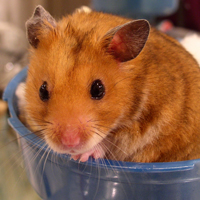- Services
- We strive to provide complete care for our patients. Learn more about all the services we provide.
WARNING
You are using an outdated browser. Please upgrade your browser to improve your experience.
 |
| Signs and Symptoms |
|
Early diagnosis is important for successful treatment and improving your pet’s quality of life. Look for these symptoms: • Change in physical appearance, such as a change in posture or attitude If you recognize one or more of these symptoms in your pet, talk to you veterinarian. Your veterinarian may recommend diagnostic tests to confirm the presence of a tumor and create a customized treatment plan for your pet. |
A tumor (also known as neoplasm) is an abnormal growth of cells; this growth may be either benign or malignant. Benign tumors do not spread throughout the body and often have a limited impact on a pet’s overall health. Malignant tumors can develop in one location, such as a hormone-producing gland, and then spread to other body parts. Treatment and prognosis for malignant tumors depends on the type of cancer, where the tumor is located, and at what stage it is diagnosed.
Pancreatic tumors are one of the most common diseases affecting ferrets. Insulinoma is a tumor in the pancreas that causes excess secretion of insulin; this affects the body’s ability to regulate blood glucose level. Excess insulin causes hypoglycemia, which causes weakness and can cause other symptoms including disorientation, seizures, collapse, and partial paralysis of the hind legs.
Tumors are common for many pocket pets, including hamsters and gerbils. For example, hamsters are frequently diagnosed with benign tumors in the adrenal gland or lymphoma, a cancer of the lymphatic system that can affect many organs. Tumors are common in a gerbil’s ventral marking glands and appear as sores. Skin tumors may appear as large masses along different parts of a gerbil’s body, including the ears and feet. Tumors affecting the internal organs are more difficult to identify in the early stages since obvious physical symptoms are not present.
A veterinarian with experience treating tumors in small animals and pocket pets can best diagnose the precise health condition affecting your ferret, gerbil or hamster. Your veterinarian will start with a physical examination. Depending on the type of tumor and its location, a variety of different diagnostic tests may be necessary. For example, ultrasound may be used to look for tumors. Needle biopsies,blood tests, or urinalysis may also be necessary for an accurate diagnosis.
If your pet is diagnosed with a tumor, treatment will depend on the type of tumor. In some cases, surgery to remove the tumor may be highly effective at extending your pet’s life, especially if the tumor is not malignant and cancer has not spread. Early diagnosis plays a critical role; any type of tumor is easier to treat when it is detected early. While some forms of aggressive cancers cannot be cured, your pet’s quality of life can be greatly enhanced when detected early. New diagnostic methods are improving early detection and increasing treatment success rate. This is why regular veterinary exams are critical for every pet.
Source:
American Veterinary Medical Association. “Cancer in Animals,” March 2010.
Exclusive Offer
FREE Nail Trim! An $11 value - just mention the webpage!
Sign-up using the form or call us at 406-522-9491 to take advantage of this exclusive offer.
Office Hours
| Day | Open | Close |
|---|---|---|
| Monday | 8:30am | 5:30pm |
| Tuesday | 8:30am | 5:30pm |
| Wednesday | 8:30am | 5:30pm |
| Thursday | 8:30am | 5:30pm |
| Friday | 8:30am | 5:30pm |
| Saturday | Closed | Closed |
| Sunday | Closed | Closed |
| Day | Open | Close | ||||
|---|---|---|---|---|---|---|
| Monday | Tuesday | Wednesday | Thursday | Friday | Saturday | Sunday |
| 8:30am | 8:30am | 8:30am | 8:30am | 8:30am | Closed | Closed |
| 5:30pm | 5:30pm | 5:30pm | 5:30pm | 5:30pm | Closed | Closed |
Testimonial
So impressed with how Sue and Cara cared for our dog Fritz for many years until he passed away at age 15 in February. The two dogs we currently have are also so lucky to see Sue and Cara.
What can we help you find?